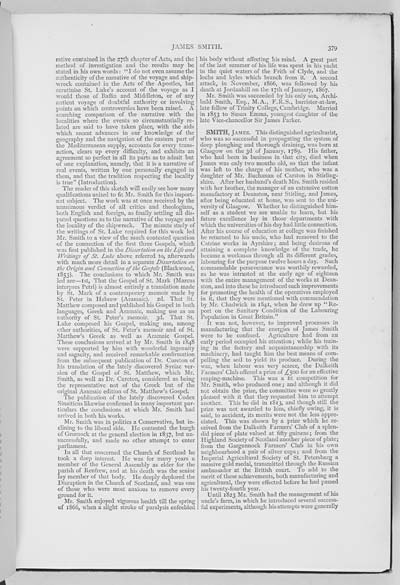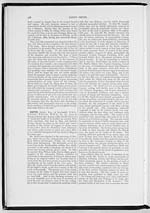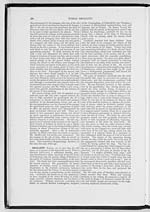Volume 3 > Half-Volume 6
(25) Page 379 - Smith, James
Download files
Individual page:
Thumbnail gallery: Grid view | List view

379 rative contained in the 27th chapter of Acts, and the method of investigation and the results may be stated in his own words: "I do not even assume the authenticity of the narrative of the voyage and ship- wreck contained in the Acts of the Apostles, but scrutinise St. Luke's account of the voyage as I would those of Baffin and Middleton, or of any antient voyage of doubtful authority or involving points on which controversies have been raised. A searching comparison of the narrative with the localities where the events so circumstantially re- lated are said to have taken place, with the aids which recent advances in our knowledge of the geography and the navigation of the eastern part of the Mediterranean supply, accounts for every trans- action, clears up every difficulty, and exhibits an agreement so perfect in all its parts as to admit but of one explanation, namely, that it is a narrative of real events, written by one personally engaged in them, and that the tradition respecting the locality is true" (Introduction). The reader of this sketch will easily see how many qualifications united to fit Mr. Smith for this import- ant subject. The work was at once received by the unanimous verdict of all critics and theologians, both English and foreign, as finally settling all dis- puted questions as to the narrative of the voyage and the locality of the shipwreck. The minute study of the writings of St. Luke required for this work led Mr. Smith to a view of the much contested question of the connection of the first three Gospels, which was first published in the Dissertation on the Life and Writings of St. Luke above referred to, afterwards with much more detail in a separate Dissertation on the Origin and Connection of the Gospels (Blackwood, 1853). The conclusions to which Mr. Smith was led are�1st, That the Gospel of St. Mark (Marcus interpres Petri) is almost entirely a translation made by St. Mark of a contemporary memoir made by St. Peter in Hebrew (Aramaic). 2d. That St. Matthew composed and published his Gospel in both languages, Greek and Aramaic, making use as an authority of St. Peter's memoir. 3d. That St. Luke composed his Gospel, making use, among ether authorities, of St. Peter's memoir and of St. Matthew's Greek as well as Aramaic Gospel. These conclusions arrived at by Mr. Smith in 1848 were supported by him with wonderful ingenuity and sagacity, and received remarkable confirmation from the subsequent publication of Dr. Cureton of his translation of the lately discovered Syriac ver- sion of the Gospel of St. Matthew, which Mr. Smith, as well as Dr. Cureton, considered as being the representative not of the Greek but of the original Aramaic edition of St. Matthew's Gospel. The publication of the lately discovered Codex Sinaiticus likewise confirmed in many important par- ticulars the conclusions at which Mr. Smith had arrived in both his works. Mr. Smith was in politics a Conservative, but in- clining to the liberal side. He contested the burgh of Greenock at the general election in 1837, but un- successfully, and made no other attempt to enter parliament. In all that concerned the Church of Scotland he took a deep interest. He was for many years a member of the General Assembly as elder for the parish of Renfrew, and at his death was the senior lay member of that body. He deeply deplored the Disruption in the Church of Scotland, and was one of those who were most anxious to remove every ground for it. Mr. Smith enjoyed vigorous health till the spring of 1866, when a slight stroke of paralysis enfeebled his body without affecting his mind. A great part of the last summer of his life was spent in his yacht in the quiet waters of the Frith of Clyde, and the lochs and kyles which branch from it. A second attack, in November, 1866, was followed by his death at Jordanhill on the 17th of January, 1867. Mr. Smith was succeeded by his only son, Archi- bald Smith, Esq., M.A., F.R.S., barrister-at-law, late fellow of Trinity College, Cambridge. Married in 1853 to Susan Emma, youngest daughter of the late Vice-chancellor Sir James Parker. SMITH, JAMES. This distinguished agriculturist, who was so successful in propagating the system of deep ploughing and thorough draining, was born at Glasgow on the 3d of January, 1789. His father, who had been in business in that city, died when James was only two months old, so that the infant was left to the charge of his mother, who was a daughter of Mr. Buchanan of Carston in Stirling- shire. After her husband's death Mrs. Smith resided with her brother, the manager of an extensive cotton manufactory at Deanston, near Stirling, and James, after being educated at home, was sent to the uni- versity of Glasgow. Whether he distinguished him- self as a student we are unable to learn, but his future excellence lay in those departments with which the universities of his day had little connection. After his course of education at college was finished he returned to his uncle, who had removed to the Catrine works in Ayrshire; and being desirous of attaining a complete knowledge of the trade, he became a workman through all its different grades, labouring for the purpose twelve hours a day. Such commendable perseverance was worthily rewarded, as he was intrusted at the early age of eighteen with the entire management of the works at Dean- ston, and into these he introduced such improvements for promoting the health of the operatives employed in it, that they were mentioned with commendation by Mr. Chadwick in 1841, when he drew up "Re- port on the Sanitary Condition of the Labouring Population in Great Britain." It was not, however, to improved processes in manufacturing that the energies of James Smith were to be confined. Agriculture had from an early period occupied his attention; while his train- ing in the factory and acquaintanceship with its machinery, had taught him the best means of com- pelling the soil to yield its produce. During the war, when labour was very scarce, the Dalkeith Farmers' Club offered a prize of �500 for an effective reaping-machine. This was a fit competition for Mr. Smith, who produced one; and although it did not obtain the prize, the committee were so greatly pleased with it that they requested him to attempt another. This he did in 1813, and though still the prize was not awarded to him, chiefly owing, it is said, to accident, its merits were not the less appre- ciated. This was shown by a prize which he re- ceived from the Dalkeith Farmers' Club of a splen- did piece of plate valued at fifty guineas ; from the Highland Society of Scotland another piece of plate; from the Gargunnock Farmers' Club in his own neighbourhood a pair of silver cups; and from the Imperial Agricultural Society of St. Petersburg a massive gold medal, transmitted through the Russian ambassador at the British court. To add to the merit of these achievements, both manufacturing and agricultural, they were effected before he had passed his twenty-fourth year. Until 1823 Mr. Smith had the management of his uncle's farm, in which he introduced several success- ful experiments, although his attempts were generally
Set display mode to:
![]() Universal Viewer |
Universal Viewer | ![]() Mirador |
Large image | Transcription
Mirador |
Large image | Transcription
Images and transcriptions on this page, including medium image downloads, may be used under the Creative Commons Attribution 4.0 International Licence unless otherwise stated. ![]()
| Biographical dictionary of eminent Scotsmen > Volume 3 > Half-Volume 6 > (25) Page 379 - Smith, James |
|---|
| Permanent URL | https://digital.nls.uk/74514324 |
|---|---|
| Attribution and copyright: |
|
| Description | Volume III. Contains names alphabetically from Macadam to Young. |
|---|

